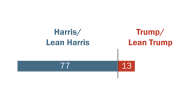More than 40 years ago, Shirley Malcom and her colleagues at the American Association for the Advancement of Science (AAAS) called wide attention to challenges for Black Americans, especially for Black women, working in science with a ground-breaking conference and report discussing minority women scientists’ experiences and recommendations for increasing representation in science.3
The new survey calls attention to some of the potential encouragements and discouragements that Black adults see – and report having experienced firsthand – when it comes to perceptions of Black achievement and education in STEM. The findings also point to Black adults’ beliefs about the factors that would do the most to increase representation in STEM fields.
Center analysis of government data shows that Black Americans continue to be underrepresented in STEM jobs. There has been little progress in the share of Black graduates from collegiate or higher-level STEM training programs over the past decade.
Asked what would help attract young Black people to pursue STEM degrees, a majority of Black Americans think it would help a lot if people saw more examples of high achievers in these areas who were Black. About three-quarters of those with a college degree or more education think this would help a lot.
Underscoring issues of representation, relatively few Black adults view STEM professional groups as very welcoming toward Black people in their ranks. While Black adults express some doubt about the openness of multiple professions to Black people, ratings for scientists and engineers are among the lowest across the nine professional groups in the survey. Those for medical doctors fare only slightly better.
Science and engineering also rank low on the list of areas where Black adults see prominent examples of Black achievement. Compared with other professional groups such as clergy and military officers, fewer say that Black people have reached the highest levels of success among scientists and engineers.
Compared with other professions, fewer Black adults see people of their race at highest levels of success in science, engineering
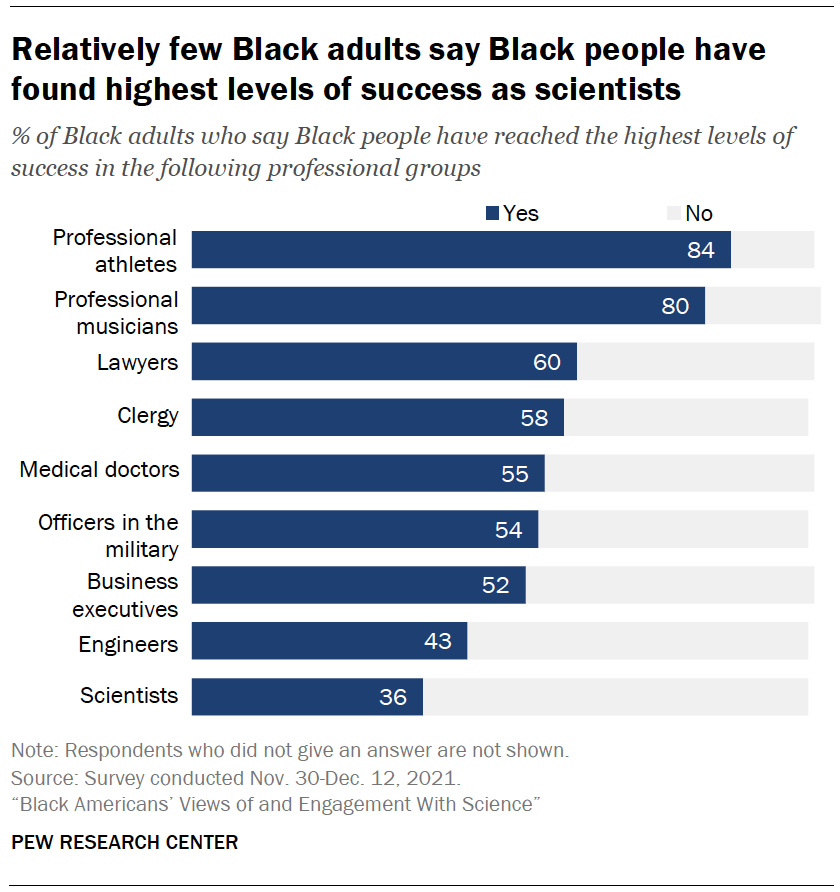
To measure perceptions of Black achievement, the Center survey asked respondents if they thought Black people had reached the highest levels of success in each of nine professional groups.4 At the top of these ratings were professional athletes and musicians; scientists and engineers were ranked lowest.
Overall, 84% of Black adults say Black people have achieved the highest levels of success among professional athletes and 80% say this about Black professional musicians. Majorities of Black adults say Black people have reached the highest levels of success in law (68%) and as religious leaders (58%).
Medical doctors are rated in the middle of these nine professional groups, with 55% of Black adults saying that Black people have reached the highest levels of success in medicine. In contrast, scientists and engineers are rated lowest among this set; 36% say Black people have reached the highest levels of success in science and 43% say this about engineers. Majorities say this is not the case.
Views of Black achievement in these STEM professions are similar among older and younger Black adults. Across levels of educational attainment, those with a high school diploma or less are somewhat more likely to say Black people have reached the highest levels of success in science and engineering than Black adults with more education. Black men are more likely than Black women to say Black scientists have reached the highest levels of success (44% vs. 31%). However, there are no gender differences in views of engineers.
The relative lack of visible examples of Black achievement in science and the allied fields of technology, engineering and math is one factor that could deter Black people from deciding to pursue STEM education and careers.
As one focus group participant phrased it in response to a broad question of “What are your thoughts about jobs in science? In technology?”:
“It’s definitely biased toward men, for sure, and it’s also biased toward specifically White men, for sure. … I know I have plenty of friends who have great ideas who are really smart, but they don’t pursue science because they don’t think that they’ll be able to get ahead in the field because it’s all dependent. Right now, everyone at the top is like old White men who will never retire.” – Black woman, age 25-39
Black Americans rate scientists, engineers comparatively low as professional groups that are welcoming of Black people among their ranks
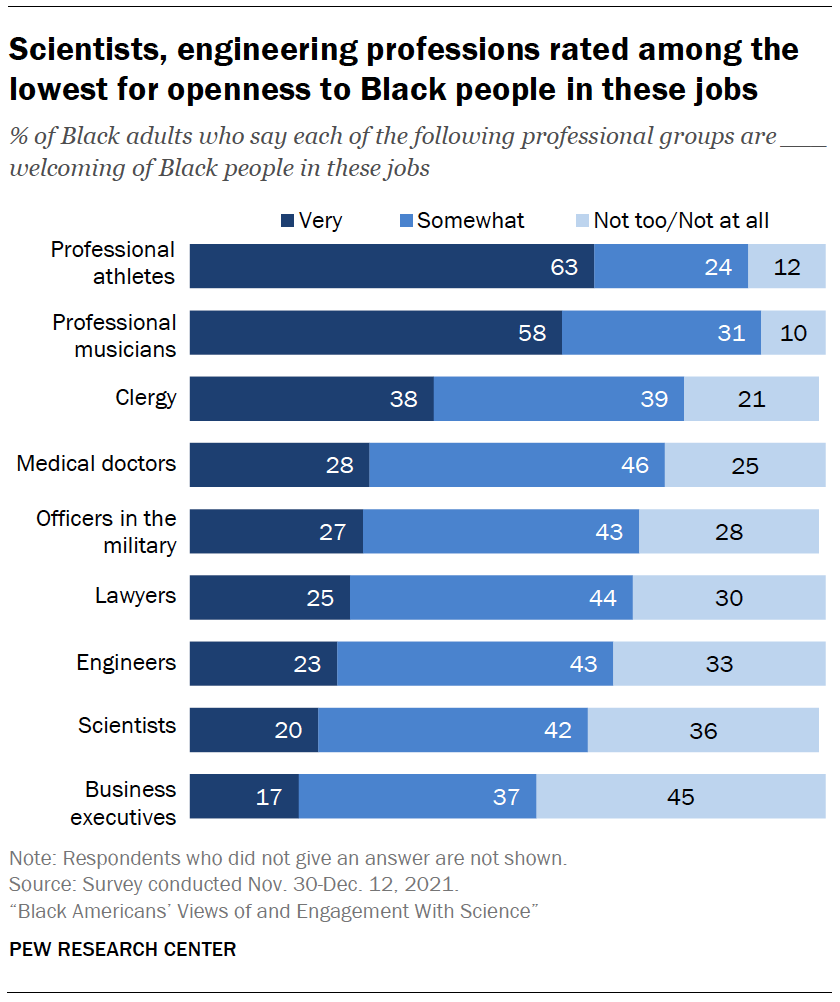
Black adults view scientists and engineers as among the least welcoming of Black colleagues across nine professional groups evaluated in the survey.
The groups most highly rated on this quality: professional athletes, followed by professional musicians. About six-in-ten Black adults say that professional athletes are very welcoming of Black people in these jobs, while 24% say they are somewhat welcoming and 12% see them as not too or not at all welcoming. A 58% majority of Black adults say that professional musicians are very welcoming of Black people in these jobs.
While trailing behind evaluations of professional athletes and musicians, clergy rank relatively high among these groups: 38% of Black adults say clergy are very welcoming to Black people in their profession while another 39% say they are somewhat welcoming.
Other professional groups are seen as considerably less welcoming. Just 17% of Black Americans see business executives as very welcoming to Black people in these jobs; 45% consider business executives as generally not too or not at all welcoming to Black people in these jobs.
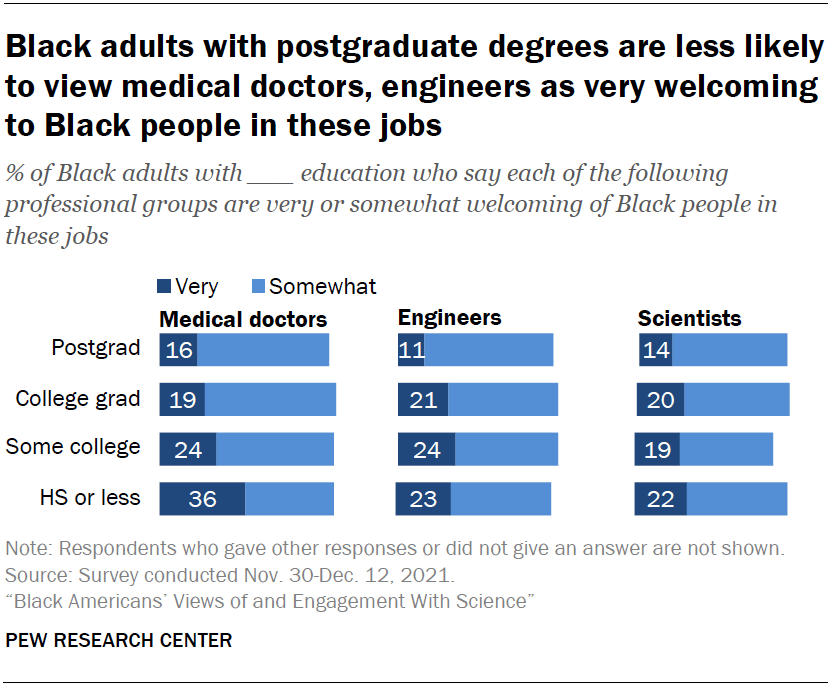
Two-in-ten say that scientists are very welcoming of Black people in these jobs, and 23% say this about engineers. Medical doctors fare only slightly better: 28% of Black adults say this group is very welcoming to Black people in medical jobs. At least four-in-ten say each of these three professional groups is somewhat welcoming to Black people in these jobs. Roughly a third say that scientists (36%) are not too or not at all welcoming to Black people in the profession; 33% say this about engineers and 25% say this about medical doctors.
Black Americans with a postgraduate degree are less inclined to see medical doctors and engineers as very welcoming to Black colleagues. Overall, just 16% of Black adults with a postgraduate degree say that medical doctors are very welcoming to Black people, compared with 36% of Black adults with a high school degree or less education.
There’s a similar pattern by education in views of the openness of engineers to Black people.
A majority of Black high school graduates recall a positive experience in STEM classes, but sizable shares also recall mistreatment
Personal experiences in the educational system are among the factors that can influence the decision to pursue – or potentially avoid – STEM degrees and jobs. On balance, Black adults with a high school degree or more education recall positive experiences more frequently than negative ones when asked to think about their most recent STEM schooling. Still, about four-in-ten Black adults with at least a high school degree (39%) say they have had at least one of the following negative experiences: being treated as if they couldn’t understand the subject matter, made to feel like they don’t belong, or receiving repeated negative comments about their race.
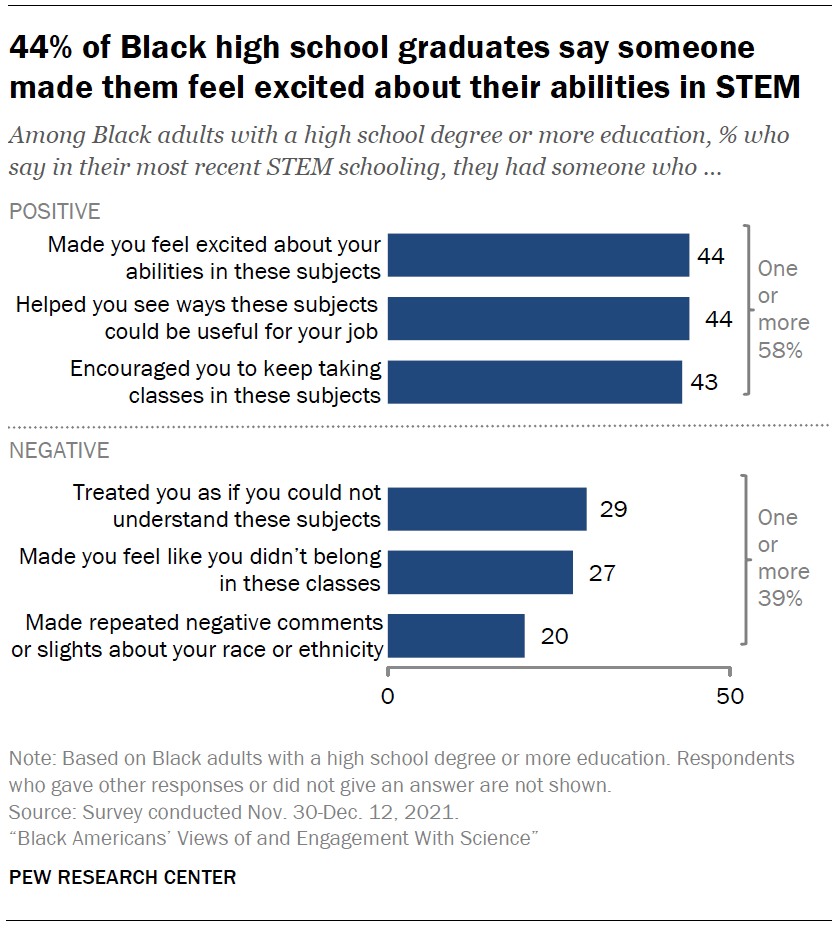
The survey asked those with a high school degree or more education about their experiences with STEM schooling. Most high schools require at least some science or math classes in order to graduate, although requirements for college and postgraduate degree programs are quite varied.
Among Black adults who have a high school degree or more education, slightly more than four-in-ten say that, in their most recent STEM schooling, someone made them feel excited about their abilities in these subjects (44%), helped them see how these subjects could be useful for their job (44%) or encouraged them to keep taking classes in these areas (43%).
At the same time, smaller, though still sizable shares, recall mistreatment or microaggressions. About three-in-ten Black adults with a high school degree or more education say they had someone treat them as if they could not understand STEM subjects (29%) or who made them feel they did not belong in STEM classes (27%). Two-in-ten among this group say that someone made repeated negative comments or slights about their race or ethnicity in their most recent STEM schooling.
While these attitudes offer a window into lasting memories from STEM educational experiences, the survey questions do not capture the full context of experiences with teachers, counselors, fellow students and others in these settings. And the findings do not speak to the frequency – whether isolated or repeated in nature – of positive and negative experiences in STEM education.
U.S. adults who have graduated from high school also report a mix of positive and negative experiences in STEM classes. Among high school graduates, similar shares of Black adults (58%) and U.S. adults (59%) say they had at least one of these three positive experiences in their STEM schooling. A third of all high school graduates say they had at least one of these negative experiences.
Black adults working in a STEM-related job are especially likely to say they have experienced both encouragement and mistreatment in their STEM schooling
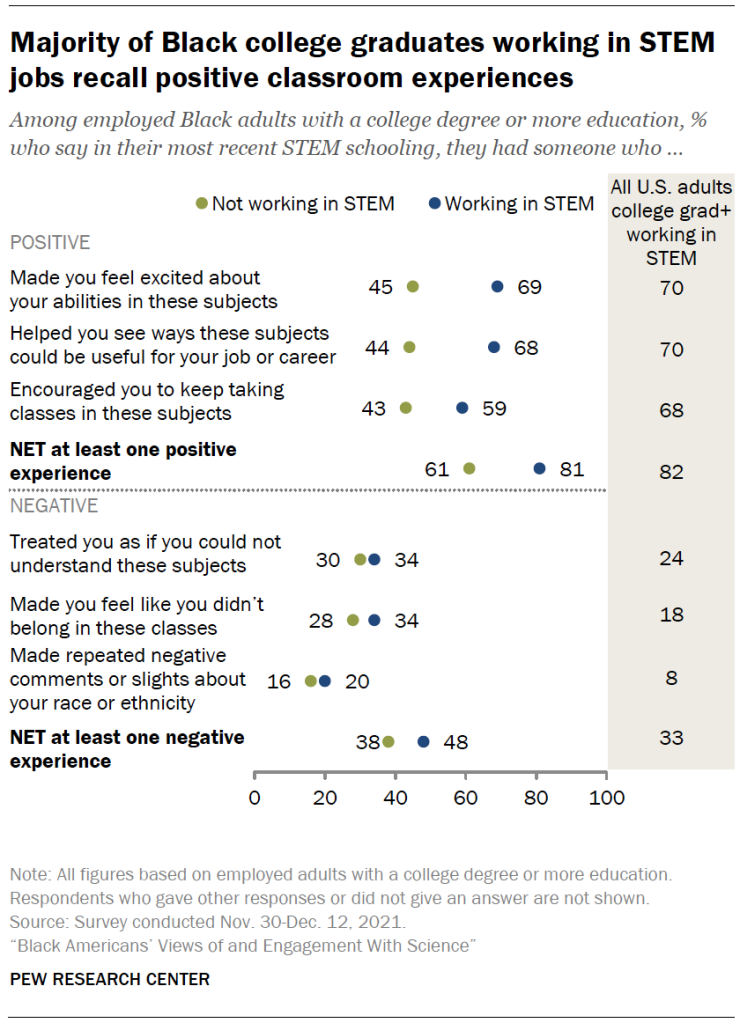
Black college graduates who are currently working in STEM jobs stand out from college graduates in other occupations when it comes to their educational experiences.5
Overall, 69% of Black college graduates working in a STEM job say that someone made them feel excited about their abilities in STEM subjects and 68% say someone helped them see the relevance of these fields for their job or career, in their most recent school experiences. Roughly six-in-ten (59%) say that someone encouraged them to keep taking more classes in these subjects. Taken together, 81% of Black college graduates working in STEM fields say they had at least one of these positive experiences.
By comparison, Black college graduates working in other kinds of jobs are far less likely to recall positive experiences in STEM classes.
The share of Black STEM workers with a college degree or more education who recall a positive experience in their most recent STEM schooling is about the same as the share of all college graduates working in STEM who say this (81% vs. 82%). However, a larger majority of college-graduate STEM workers in the general population say that someone encouraged them to keep taking classes in these subjects (68% compared with 58% of Black STEM workers).
A sizable share of Black college graduates in the workforce today recall some kind of mistreatment or microaggression in their STEM schooling, as well. Among those working in a STEM job, 34% say that someone treated them as if they could not understand a STEM subject and the same share (34%) says someone made them feel they didn’t belong in these classes. Somewhat fewer among this group (20%) say someone made repeated negative comments or slights about their race or ethnicity. About half of Black college graduates working in STEM (48%) say they had at least one of these negative experiences in their most recent school experience.
Notably, among STEM workers with a college degree, a larger share of Black adults (48%) than U.S. adults overall (33%) say they had at least one of these three negative experiences during their STEM education.
These findings are suggestive of potential deterrents Black adults may face in pursuing training in science or allied fields. Ebony O. McGee, a scholar focused on diversity in STEM higher education, finds that Black people pursuing a higher degree and career in science or another STEM field face an array of obstacles such as stereotyping and implicit biases.
The patterns here are also in line with a 2017 Center survey which included a large sample of STEM workers. In that survey, Black STEM workers were particularly likely to report race-related slights or other inequities on the job. In all, 62% of Black STEM workers said they had experienced at least one of eight specific forms of discrimination because of their race or ethnicity. This is greater than the shares of Black workers in non-STEM jobs (50%) who reported the same, and far greater than the shares of STEM workers of other racial and ethnic backgrounds who said they experienced this.
In the new survey, levels of educational attainment are also associated with Black people’s recollections of positive and negative experiences with STEM schooling. See Appendix for more details.
Though not necessarily a causal effect, Black representation among a person’s high school teachers is associated with more positive experiences with STEM schooling.
Among Black adults with a high school degree or more education, 49% say they had at least one same-race high school teacher in a science, technology, engineering or math class. Those who did are more likely to recall positive experiences in their STEM schooling. For example, 52% of those who had a Black high school STEM teacher say that they have had someone encourage them to keep taking STEM classes, compared with 34% of those who did not have a STEM high school teacher who was Black. Both groups are about equally likely to report negative experiences in STEM schooling. See Appendix for more details.
One focus group participant talked about his responses to having a Black STEM teacher this way:
“In high school, my biology and my chemistry teachers were Black. They were Black women and they were excited about science and they [instilled] that excitement in me.” – Black man, age 40-65
Another participant felt she missed out without a Black role model in her high school STEM classes:
“In the entirety of my science and history classes (because I was pre-med and I did all my science classes), over all of that stuff, I never had a Black professor. I never saw anyone in that position. So I was like, what am I doing here? I think there’s a lack of representation … that kind of furthers the whole unwelcome atmosphere too.” – Black woman, age 25-39
Half or more Black Americans see mentors as especially influential to how many young people pursue STEM degrees
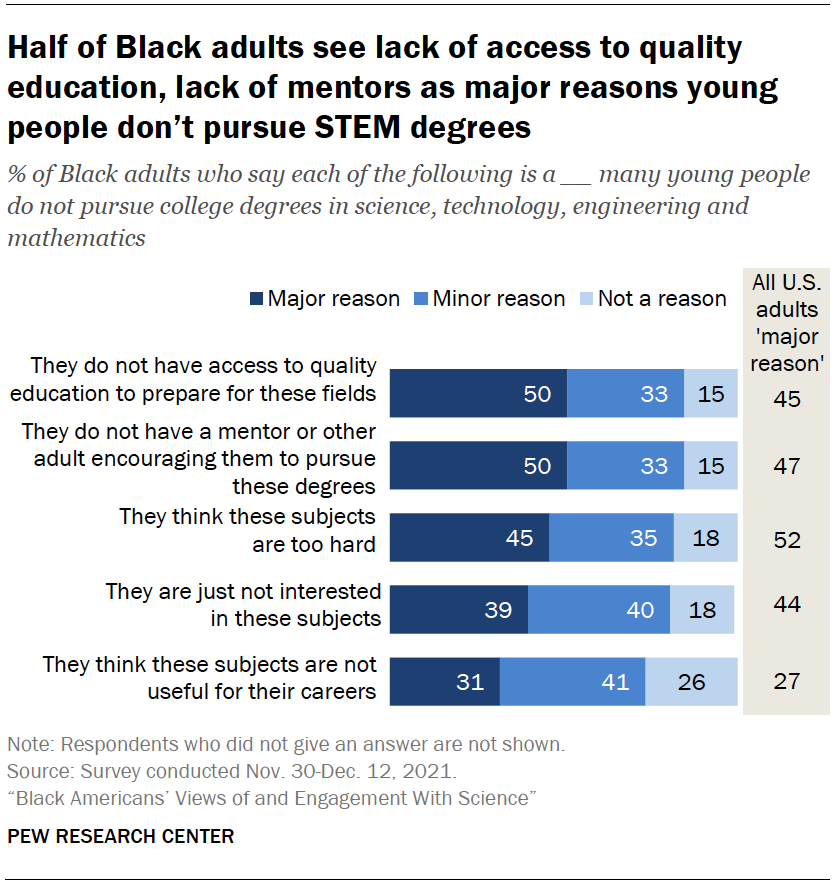
Black Americans see a variety of factors behind the limited number of young people pursuing STEM college degrees.
Half of Black adults say the lack of a mentor or other adult encouraging young people to pursue these fields is a major deterrent, while a third consider this a minor reason why more young people don’t pursue college degrees in STEM.
The same share (50%) says lack of access to quality education is also a major reason that more young people do not pursue STEM degrees. (Note that these questions reference young people, generally, without specifying their race or ethnicity.)
In addition, 45% of Black adults say a major difficulty comes from young people thinking that STEM subjects are too hard and 39% say disinterest in these subjects is a major reason behind STEM enrollment figures for young adults.
About three-in-ten Black adults (31%) think young people not seeing the usefulness of these subjects for their careers is a major reason many young adults don’t pursue college-level STEM degrees; another 41% say this is a minor reason.
Views among Black adults on these questions are generally similar to those of the overall U.S. population. However, all U.S. adults place somewhat greater emphasis on the difficulty of the subject matter as a major reason for why more young people do not pursue STEM college degrees.
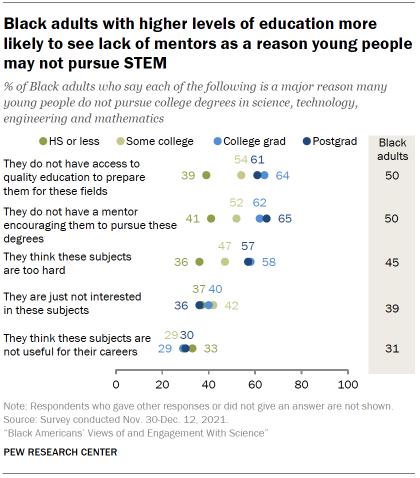
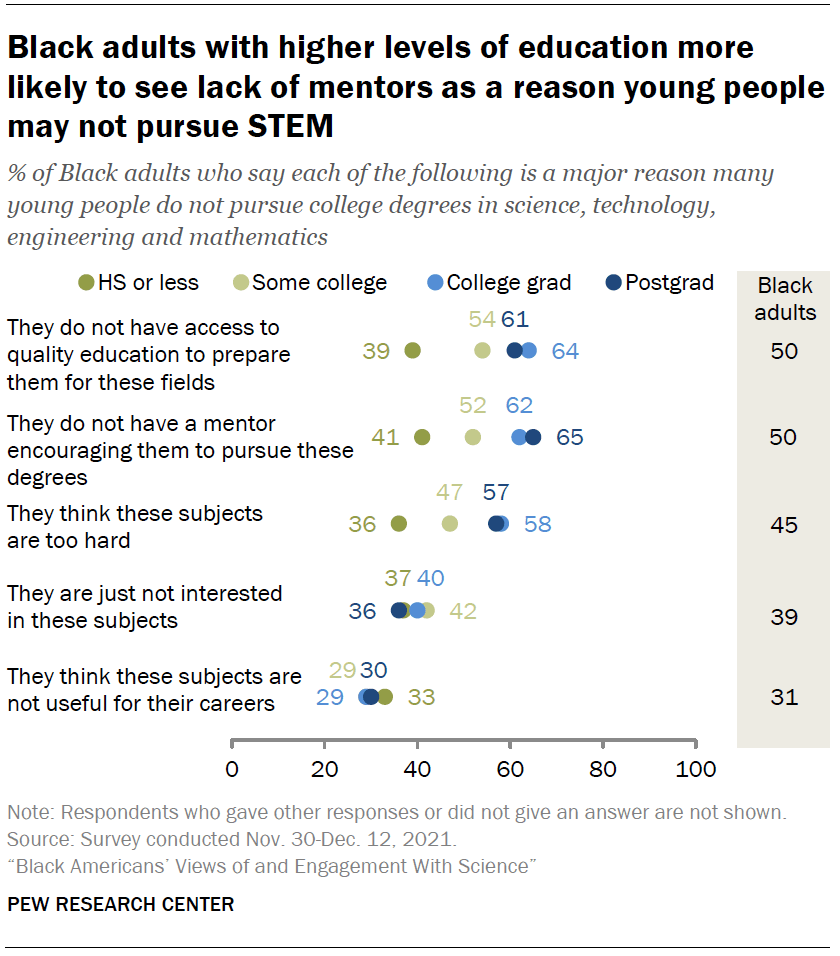
Black, along with Hispanic, students have long been underrepresented in STEM degree programs, compared with the share earning degrees in other fields. According to recent data from the U.S. Department of Education, Black students earned no more than 9% of the STEM degrees awarded in 2018 across the bachelor’s, master’s and doctoral levels – figures that have changed little since 2010.
Black adults with higher levels of education are particularly likely to point to the absence of a mentor and the inaccessibility of quality education as major reasons more people don’t pursue STEM college degrees.
Majorities of Black adults with a postgraduate (65%) or college (62%) degree say the lack of a mentor or other adult encouraging young people is a major reason behind this pattern.
About six-in-ten Black adults with a postgraduate degree (61%) and 64% of those with a college degree say that the lack of access to quality education is a major reason more young people do not pursue STEM degrees in college.
A majority of Black Americans think more young Black people would pursue STEM studies in college if they saw examples of high achievers in these areas who are Black
The Center survey also asked about views on specific factors that could encourage more young Black people to pursue STEM college degrees.
A 54% majority of Black Americans say that more visible examples of high achievers in these fields who are Black would make young Black people a lot more likely to pursue college degrees in STEM, while 27% say this would help a little and 16% say this would not make a difference.
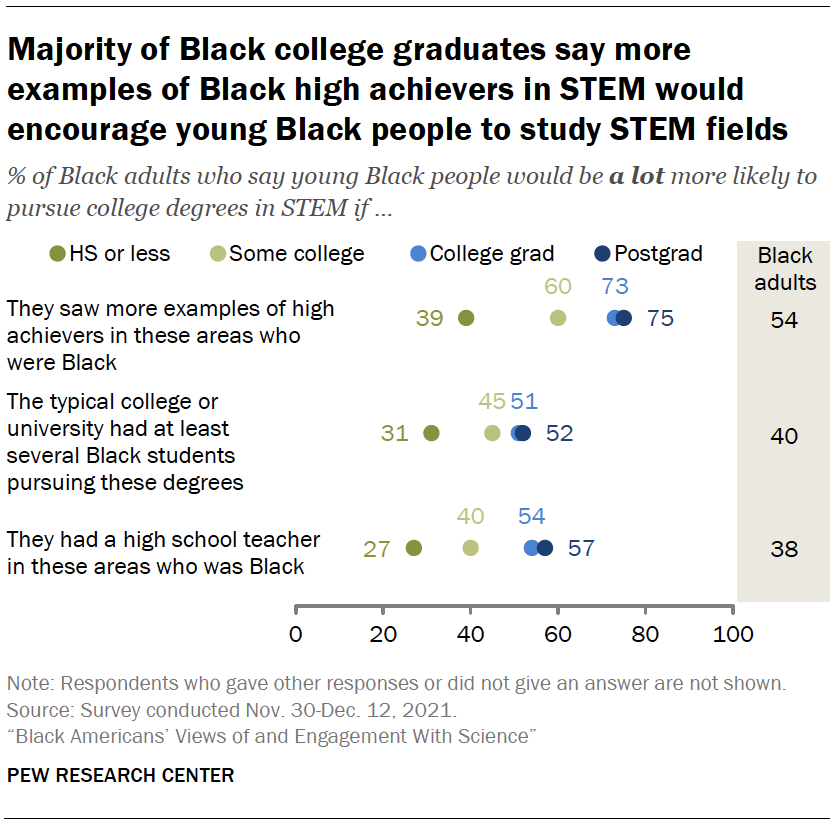
Four-in-ten Black Americans think having more representation among students in STEM programs would make young Black people a lot more likely to pursue college degrees in STEM. A similar share (38%) says young Black people would be a lot more likely to pursue college degrees in STEM fields if they had a high school teacher in these subjects who was Black. (This view was about equally common among those who had and did not have a Black high school teacher in a STEM class themselves.)
The importance of visible examples, which some people equate with mentors or role models, also came to mind in focus group discussions on this topic. One focus group participant, in talking about teens, explained:
“They need examples. They need mentors. They need people in those fields to essentially walk them through. I always tell my youth, it’s easy to do something when you’ve seen it.” – Black man, age 25-39
Black adults with higher levels of education are especially likely to see all three of these options as factors that would help attract more young Black students to STEM.
For example, 75% of Black adults with a postgraduate degree and 73% of those with a college degree say that seeing more examples of high achievers in STEM fields who are Black would help a lot to attract more young Black people to these fields. By comparison, 60% of Black adults with some college education say this would help a lot and 39% of those with no more than a high school diploma say this.
There are similar patterns by education when it comes to the impact of having a same-race high school teacher in STEM classes and the typical college or university having at least several Black students in STEM degree programs.
Though relatively smaller shares of Black adults with a high school diploma or less education see any of these options as helping a lot to attract more young Black people to STEM degree programs, majorities say that each would help at least a little.


